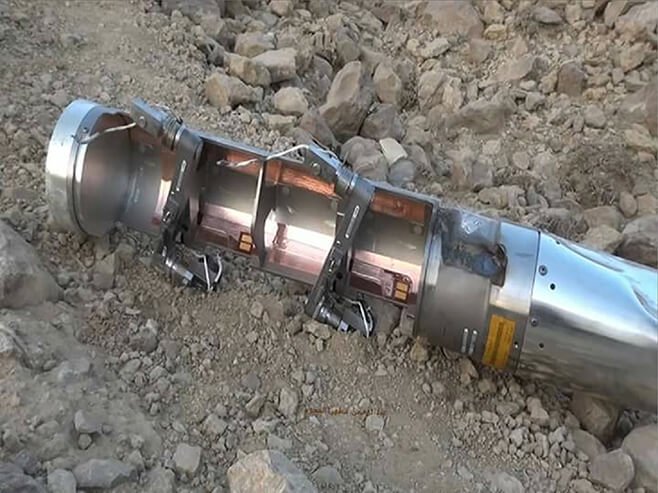Human Rights Watch has found that Saudi Arabia is dropping U.S.-supplied cluster bombs in the fight against Houthi rebels in Yemen.
The deadly small bombs, if unexploded, can lie dormant and then detonate when people stumble upon one, killing or maiming them as a result. The tiny bomblets contained in each package resemble bouncing balls used by children and often kill them more than adults as a result their playful look.
While an international treaty banning cluster bombs has been adopted by 116 countries, the United States, Saudi Arabia and Yemen are not among them.
The evidence uncovered by Human Rights Watch (HRW) includes a video, marked-up satellite maps and photos of the weapons.
The video shows delivery devices falling from the sky by parachute and then deploying the bombs with a burst of black smoke in mid-air. Shallow explosions then spread over areas on the ground below. The images were shot in April, HRW said.
The exact type of cluster munition used are CBU-105 Sensor Fuzed Weapons, which are guided bombs intended to take out tanks and other armored vehicles with a blanket of explosions spread out over a large area.
If the cluster bombs do not find their target, they are designed to self-destruct mid-air, or if that fails, to deactivate themselves after a short time. This should prevent indiscriminate killing but often those mechanisms don’t work, posing a lethal danger for those who later find them.
The Department of Defense has announced it will stop the transfer of cluster munitions to foreign governments, so long as the weapons leave behind more than 1% of their bombs unexploded, but not until after 2018.
“Saudi-led cluster munition airstrikes have been hitting areas near villages, putting local people in danger,” Steve Goose, the director of HRW’s arms division, said in a press release. “These weapons should never be used under any circumstances.”
The activists say the cluster munitions were dropped over northern Saada governorate, a Houthi rebel stronghold near Saudi Arabia. The satellite map shows the target area near the villages of al-Ssam and al-Safraa.
About 5,000 people live in al-Safraa in times of peace, HRW said.
The incident draws attention to the business of selling arms, which is a large industry here in the U.S. In times of peace the sales are easy money – expensive weapons sold to customers who pay cash. But in times of war the ethical implications of these sales need to be properly examined.
It also creates negative perceptions of America even if we’re not dropping the bombs. If the Saudis show up on the battlefield in American fighter planes and then drop American weapons on the villages and other civilian populations, we get the blame and not the Saudis.
All weapons are clearly stamped with a country of manufacture, so it ends up appearing like we’re the bad guys. This has serious implications for our standing around the world.
Stay Connected

